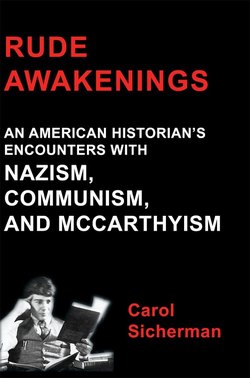Читать книгу Rude Awakenings: An American Historian's Encounter With Nazism, Communism and McCarthyism - Carol Jr. Sicherman - Страница 11
На сайте Литреса книга снята с продажи.
“Darling Harry” at Fieldston–the route to Harvard
ОглавлениеFrom the very moment of his birth in 1909, Harry was destined for great things by his adoring parents. An early–perhaps his first– letter to his parents says it all: “Dear Mamma and Papa. I am a Good boy. Lots of Love and I am saving Kisses–Darling Harry.” When his father detected favoritism at the local public school because he was a principal’s son, he sent him to the Ethical Culture school later known as Fieldston. The school, founded by the philosopher Felix Adler, imparted excellent intellectual training and a liberal sociopolitical formation to the children of the Jewish elite, although it was not explicitly Jewish.38 A roster of graduates published to commemorate the school’s seventy-fifth anniversary lists forty of the approximately sixty members of Harry’s class and gives a sense of their place in the world.39 Four of the twelve men who responded had gone to Harvard, as had Harry’s good friends Joseph Doob (Fieldston ’26) and Edwin Popper (Fieldston ’28). While it may seem impressive that a third of the boys went to Harvard, this is proportionately much less than the eighteen out of twenty-two Groton graduates who entered Harvard’s class of 1900, among them Franklin Delano Roosevelt.40 Such establishments were Harvard’s main feeder schools, and their graduates set a tone quite alien to Fieldston alumni. Roosevelt and his ilk were WASPs‒White Anglo-Saxon Protestants‒and formed the dominant social group at the most prestigious universities.
Harry graduated from Fieldston in 1927 as valedictorian and president of his class.41 Despite having traveled in France, Switzerland, and Italy on a closely chaperoned school study trip the previous summer, he entered Harvard a sheltered and unworldly young man.42 To get there, he had hardly lifted a finger: he applied nowhere else, not out of bravado but out of ignorance. His only conception of what a college education might mean was derived from the biochemist hero of Sinclair Lewis’s novel Arrowsmith, which won the Pulitzer Prize in 1926; he wanted to be like Arrowsmith.
As the fall semester approached, the newly appointed Dean of Harvard College, A. Chester Hanford, requested each father of an incoming freshman “to write about him…as fully as you are willing to do,” promising that any “deficiencies in his earlier education or weaknesses of character would be kept confidential.” Sophie kept Louis’s draft because, she explained in a note, she wanted Harry to “see, some day,…what your darling ‘Pop’ thought of you–and how well he understood you.” There were four headings: Physical, Intellectual, Moral, and Social. Under the first, Louis described Harry as “a big healthy young man weighing about 170 pounds” (he was somewhat overweight much of his life), whose “personal appearance is a little above the ordinary.” He was “not proficient in any special athletic activity,” but–Louis reassured sports-obsessed Harvard–“he has the vigor and the stamina to succeed in any line of this sort which may interest him.” None ever did; however, as his father noted, his “unusual muscular coordination” at least made him “skillful with tools from his earliest years.”
The headings “Intellectual” and “Moral” show, as one might expect, some inclinations that characterized the adult Harry and some that did not. Having learned to read before entering school, he had a “vigorous appetite for independent reading”; a carefully posed photo shows Louis and Harry (age eight) reading together. His intellectual interests were mainly “scientific, mechanical, mathematical and philosophical…rather than artistic or linguistic.” By the time he graduated from Harvard, he had shed his former preference for “the Museum of Natural History or an automobile exhibit” (reported by Louis) and had developed strong interests in art history, music, and languages. At Fieldston, Louis wrote, he had enjoyed debating about ethics and economics–a pleasure that appears throughout his Berlin diary–and had “never missed a meeting” of the Saturday night discussion club of which he was secretary. Under “Moral,” Louis observed his “fine sense of right and wrong”; everyone who knew him appreciated “his strong sense of duty and responsibility.” One of his teachers had summed him up, Louis recalled, by saying that “Harry has ideas and ideals.”
Under the final heading, “Social,” Louis observed that until recently Harry had shown no interest in girls but had lately “formed an attachment for one of his former girl classmates.”43 He was afflicted with a painful shyness “in the company of strangers,” which was “one of his greatest weaknesses.” His compensating strength was an ability to form strong friendships. As a teenager he had been with Ed Popper and Joe Doob at school and at summer camps in Maine, and he overlapped with them at Harvard; they figure again and again in his Berlin diary.44 The last social characteristic Louis described was endearing: “Altho usually serious in all he does… Harry has a quick and keen sense of humor, and a smile which will be a great asset throughout his life.” And so it was.
Part 2. Harry’s Harvard: Professing Inclusion, Practicing Exclusion
